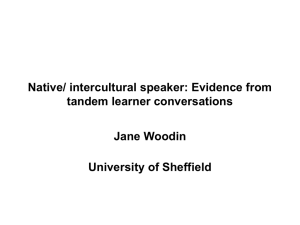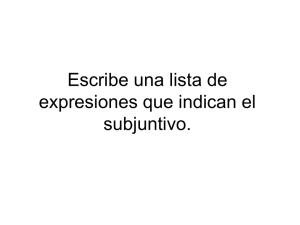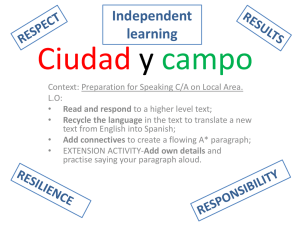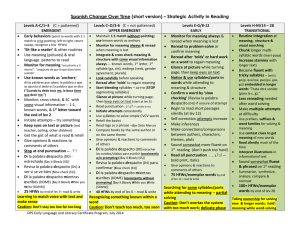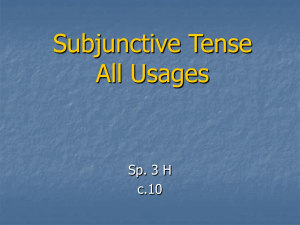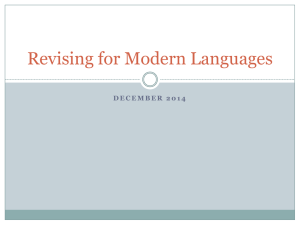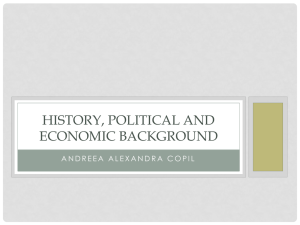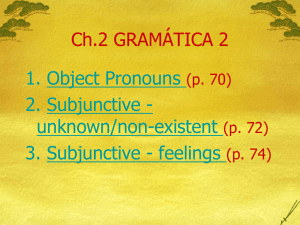Theories of Intercultural Communication Language and Intercultural
advertisement
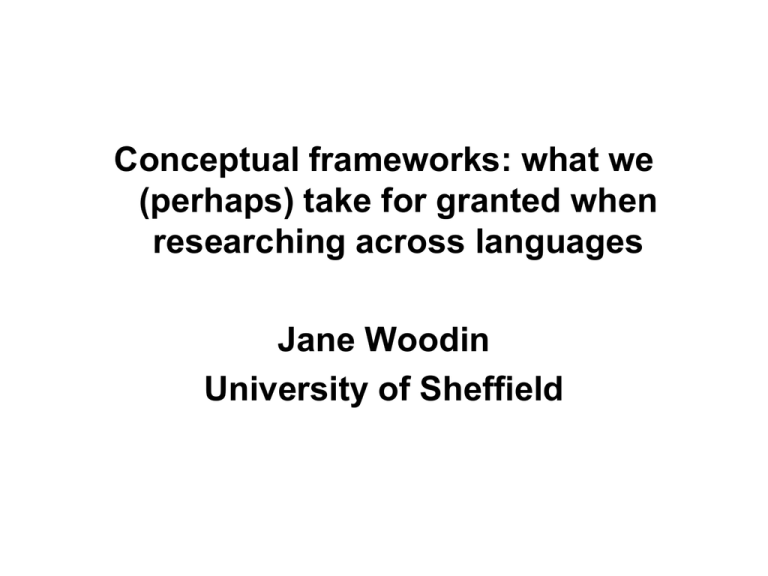
Conceptual frameworks: what we (perhaps) take for granted when researching across languages Jane Woodin University of Sheffield • This contribution will offer some insights into possible linguistic differences in conceptual frameworks relating to everyday words in languages (in this case English/Spanish). Through the consideration of examples of bilingual conversations between language learners, it will ask how easy it is in real-time communication to 'decentre' from the communication focus and consider the communication process itself. Possible implications of this question will be linked to 'Doing Research Multilingually', whether through research in multilingual groups, or working with multilingual data. Weirzbicka (1992, 1997, 2003) - aims to find universals across languages In 1992, she proposed 13 semantic universals: I, you, someone, something, this, want, don’t want, say, feel, think, know, where & good (1992:10), and in later work (e.g. 2003) suggests that around 60 should be enough for a ‘practical lingua franca for articulating different culture-specific conventions, norms and values.’ (2003xviii) They would need to fall into the following criteria: • • • • • these concepts must be intuitively clear and self-explanatory; they must be impossible to define they should be demonstratively active as ‘building blocks’ in the construction of other concepts. they should ‘prove themselves’ in extensive descriptive work involving many different languages of the world they should also ‘prove themselves’ as lexical universals, as concepts which have their own ‘names’ in languages of the world. • (1992:12) Thank (Wierzbicka) thank (a) I know: you did something for me (b) I feel something good towards you because of this (c) I say this because I want you to feel something good kansha suru (a) I know: you did something good for me (b) I say: I feel something good towards you because of this (b’) I know: I couldn’t do something good like this for you (b’’) I feel something bad because of this (c) I say this because I think I should say it Conceptual frameworks It is generally accepted that word associations are closely related to the understanding of conceptual meaning (Schmitt and Meara, 1997). This is not simply cultural but also individual: Shore (1996) : origins of concepts reside in both personal mental models and cultural mental models. He groups lexical sub-models within cultural mental models, which include linguistic structural models. For Shore, lexical sub-models include for example taxonomies and lists. Díaz-Guerrero & Szalay (1991): Equality • ‘Cooperation and communication about anything whatever requires some minimal access to the interlocutor’s current states of belief and intention. ….. • [It] also requires a shared conceptual map of the world, as represented in the group’s commonly-held lexical-semantic categories’ (Givón, 2005:62) Modern Foreign Languages (MFL) perspective Research into conceptual frameworks (Szalay & colleagues, Grabois, 1997, Hinkel 1999, Lantolf, 2000) has shown: • differences in the conceptual frameworks of native speakers of different languages • even after 10 years of living in another country. - inseparability of language and culture? - ‘languaculture’ (Agar 1993) - not totally overlapping (Risager, 2006) An example • Tandem learners’ conversations about word meaning • Cooperar/cooperate • The broader frame: evidence from association activities undertaken by 62 native English and 62 native Spanish speakers Cooperate/cooperar Cooperar/Co-operate Spanish % English % obligation/control /obligación/control 0 0 7 2.5 fiesta/party 3 1.3 9 3.3 gente/grupo/people/group 30 12.9 33 12.1 desarrollo/futuro/development/pobreza/poverty 33 14.2 19 7 importante/important 17 7.3 11 4 auyda/r/help/(buena) voluntad/(good)will 93 40 69 25.3 juntar/to bring/come together 6 2.6 9 3.3 comunicación/communication 17 7.3 30 11 gobierno/sociedad/government/society 8 3.4 41 15 trabajo/work 25 10.8 45 16.5 Total 232 99.8 273 100 40 30 Spanish 20 English 10 0 oblig. party people devpt impt help bring tog. comm. govt. work Lily & Maica (cooperar) Sequence 4 • 1. M: pero para ti cooperar significa (.) ayuda, o? but does co-operar mean (.) help for you, or? • 2. L: um (.) no, no ayuda um (.) no, not help • 3. M: ¿no? no? • 4. L: hablar, pero... to speak, but…. • 5. M: para mí significa ayuda, (L jeje) significa completamente distinto (.) tiene un significado completamente distinto. for me it means to help (L laughs)..it means completely different, it has a completely different meaning 6. L: estos son las dos para mí. Ayudar (.) y hablar. it’s both for me. to help and to speak 7. M: pero hablar, cómo? but to speak, in what way? 8. L: hablar (.) si tú um (.) di, dices a mí, um vas a, quiero que, no (.) cooperas? con yo to speak, if you um, say to me you are, I want, you (.) are not cooperating with I 9. M: conmigo with me 10. L: conmigo, Y (..) yo coopero? jeje with me and (..) I co-operate (laughs) 11. M: pero no sé no entiendo (2.0) no lo sé (1.0) es que para mí, cooperar es ayudar, en todos los sentidos but I don’t understand (2.0) I don’t know (1.0) for me, co-operate is to help in all its meanings Lily & Maica, Sequence 6 1. L: emmm sí creo que en tu (..) what’s opinión? ummm yes I think that in your (..) what is ‘opinion? 2. M: opinión jeje opinión (laugh) 3. L: opinión la palabra cooperar significa ayudar, pero a mí um significa un poco más serioso? opinion, the word co-operar means to help, but for me it means a little more serious (serioso) 4. M: serio serious/formal (serio) 5. L: serio (..) um cuando pienso de la palabra cooperar, pen pen pienso de la palabra cooperar, um pienso de una un situación bastante serio, como en una comisaría, porque serio (..) um when I think of the word cooperar, I think of the word um I think of a quite a formal situation like in a police station, because 6. M: ah ah 7. L: La palabra es bastante formal the word is quite formal 8. M: yo, sí la utilizaría (.) además por ejemplo, también (..) sí, es que para mí es igual que ayudar. (..) no (.) es igual, no es el mismo significado, pero prestar tu servicio a alguien o eso, ayudar, sí, lo que tú has dicho I would use it as well for example, also (..) yes, for me it is the same as ayudar, (..) it isn’t (..) the same, not the same meaning, but to offer your help to someone, or to help, yes, what you have said Gill (NS) and Eva (NNS): (cooperate) Sequence 1 6 G like um the people who have contact with do you generally cooperate well with them or 7 E oh then I might not have a good understanding of the word um= 8 G =what did you think, what did you say that you thought it meant cooperate 9 E um for example um two countries that co-operate uh with um fighting against terrorism [for example 10 G okay yeah] what you use this word for uh States and Britain cooperating to to fight terrorism and 11 E yeah 12 G what in this case you mean it's bad cooperation 13 E Well maybe it's maybe they have a good cooperation but [for bad purposes= 14 G oh I see] sure Gill (NS) and Eva (NNS): (cooperate) Sequence 8 6. G It’s very difficult to think of any other, I think we’ve exhausted the uh (e jeje) (2.0) 7. E uh yeah I can think of the of the police, for example? um that sometimes to do their investigations needs the co-operation of people (G uhuh) that have knowledge about 8. G that’s 9. E specific areas (Gmhm) or 10. G or things that have happened yeah (..) yeah good idea, actually yeah, people that co-operate with the police [or 11. E how] you call that witnesses also co-operate with the law 12. G mhm Researching multilingually • If language learners, on a language learning task, focused on word meaning, do not find it easy to consider possible differences in meaning of words, then how easy is it for intercultural teams to do so? • How easy is it for us to consider that the results of what we are researching can be ‘free’ of language – related issues ? • What assumptions do we make with regard to translatability of conceptual meaning when working with data/teams multilingually? • What would happen if we used another language? What processes might we wish to adopt when working multilingually? • definitions of key concepts from/in a variety of perspectives / languages? • utilisation of lingua/cultural mediators ? • reflection/step back moments for consideration of the process? • - re-doing research in another language medium? Some further thoughts • How is working multilingually different from working across multilingual groups using English as a Lingua Franca? • Or across for e.g. institututional speech communities?
